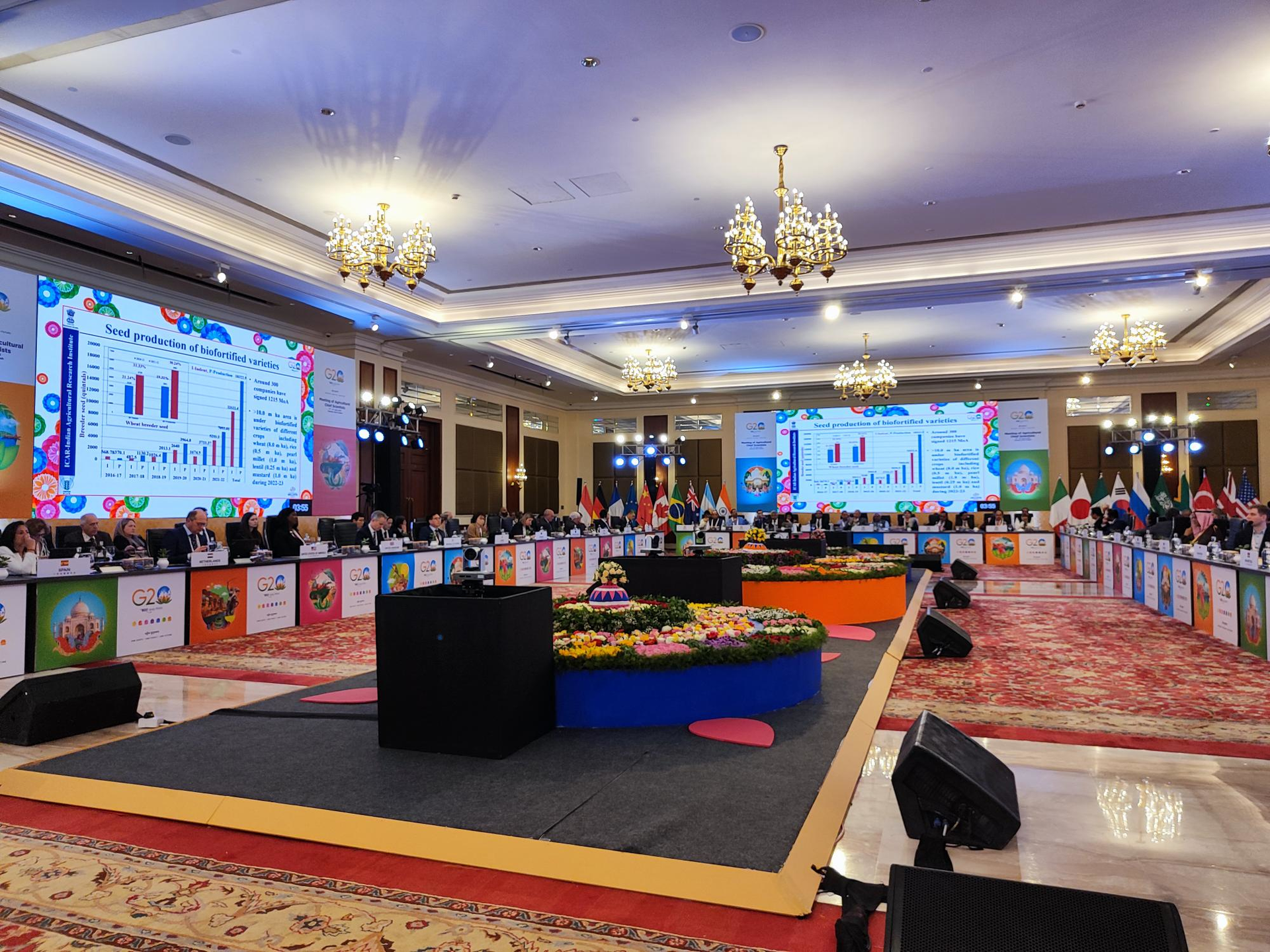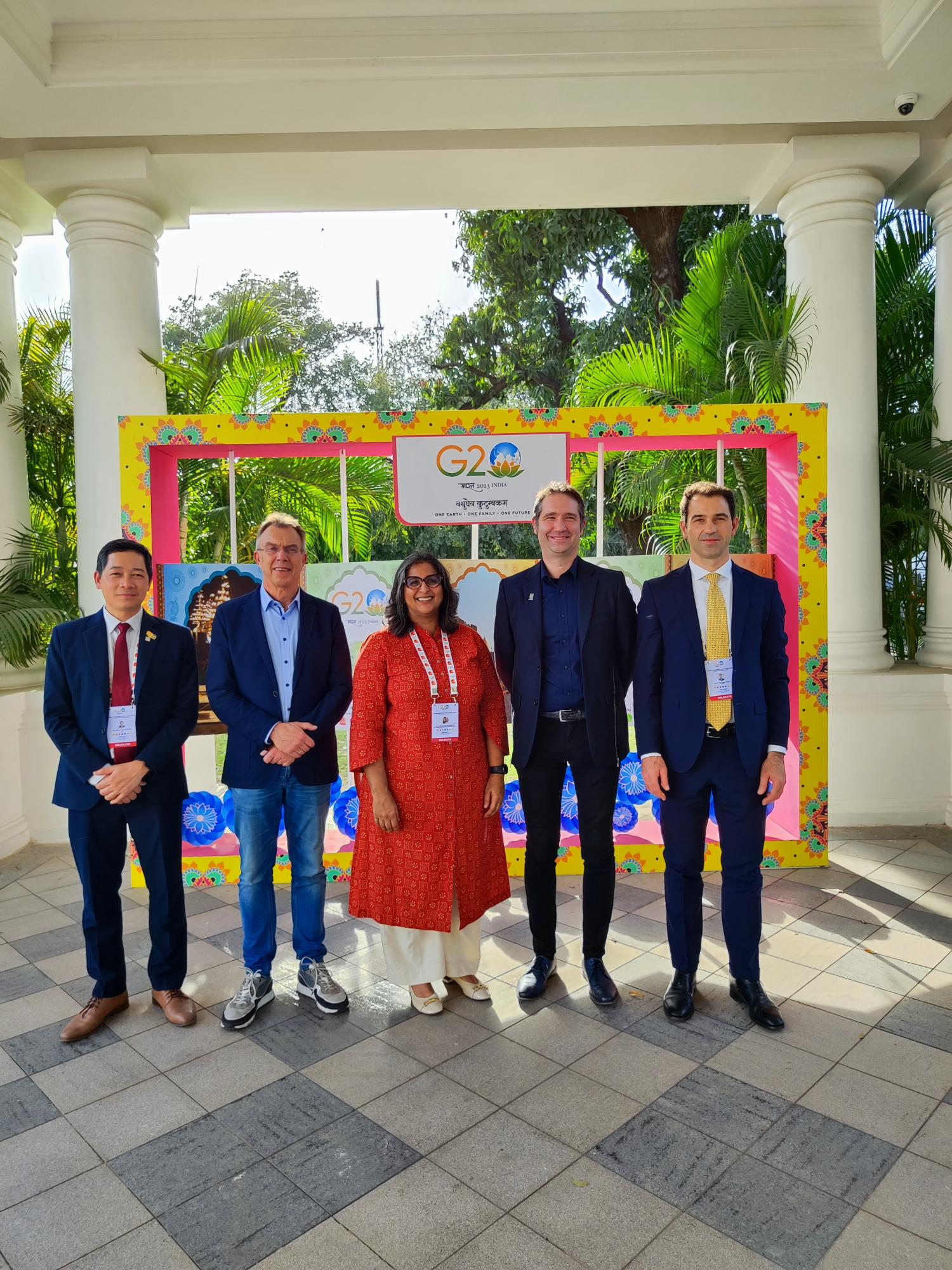Blog Creating an Enabling Environment for Sustainable Food Systems: Insights from the G20 MACS Meeting 2023

Varanasi, 19 April 2023. During the G20 Agricultural Chief Scientists Meeting (G20 MACS), CGIAR delivered a statement about the pivotal role technological innovations and public-private partnerships play in agriculture and their importance towards the achievement of the Sustainable Development Goals.
The Annual Meetings of Agricultural Chief Scientists of G20 States (MACS-G20)
G20 Member States, Invited Countries, and International Organizations including CGIAR discussed ways to accelerate the transition toward more sustainable food systems at the Agricultural Chief Scientists Meeting (MACS) as part of the G20 Presidency of India.
Under India’s G20 Presidency theme “One Earth, One Family, One Future” the meeting convened a session dedicated to Public-Private Partnerships in Agricultural R&D. Discussants vetted how such partnerships should be more effective to support the sharing of innovative and science-based technological solutions for achieving sustainable agrifood systems, food security, and nutrition. The sessions featured presentations on “Agri-tech Startup Ecosystem” from the Asian Development Bank (ADB) delivered by Navin K. Twarakavi, on “Partnerships Model for Improving Lab Improving Lab to Land and Outreach” from the UN FAO delivered by Dr. Selvaraju Ramasamy, and on “Public-private Agri-R&D for Public Goods: Experience in Generating and Accelerating Innovations” from IRRI/CGIAR delivered by Dr. Jean Balie and from CIMMYT/CGIAR by Dr. Bram Govaerts.

A cross-cutting theme among the different presentations was the revelation that innovation is key in the agricultural sector, as it provides solutions to some of the most pressing challenges facing our world today; such as climate change, food insecurity, and malnutrition. However, innovation cannot be achieved in isolation. The public and private sectors must work together to create an enabling environment that promotes open dialogue, knowledge sharing, investment promotion, regulatory alignment, and policy coherence.
In its statement to G20 delegates, delivered by Temina Lalani-Shariff Regional Director of South Asia, CGIAR advocated for more support through funds and policy instruments from G20 Member States to scientists for the de-risking of technology, market-testing, and iteration of their innovations. Public sector support for innovative agricultural R&D has the potential to enable scientists to explore innovative solutions, unlock private funds for further support, and engage the necessary communities. When innovations are in their early stage and the development costs are high, the private sector may not invest in the scientific product unless there is a buyer, so the public sector can fill a critical gap to invest in the sustaining of this research until innovations are market ready. In addition, public funding could provide a backbone for a more equitable and democratic innovation process for agricultural technologies: as opposed to the risks of being side-lined while private capital alone focuses on the easiest and highest possible profit pathway to scale, public involvement in innovative R&D initiatives can help ensure small-holder farmers and marginalized groups remain at the center of development and scaling processes.
Breakthroughs in machine learning, artificial intelligence, and perception technology to accelerate sustainable agriculture are already being developed and are in need of support from public and private sectors, as articulated above. More can be done to accelerate these scientific innovations, such as the work of new initiatives like the CGIAR Accelerate for Impact Platform: a venture space that bridges science and entrepreneurship, while acting as an innovation ecosystem enabler to support scientists, entrepreneurs, and agri-tech ventures in their journey to impact.
“There is a greater consensus among the G20 countries about the importance to support more innovation from lab to market,” said Gianpiero Menza, Senior Manager of Partnerships & Innovative Finance at Alliance/CGIAR and participant at the MACS-G20. “What it is yet missing is a courageous plan to set up innovative funding schemes”.
The private and public sectors must work together to develop science-based, frontier technologies that will play a meaningful and critical role in the transformation of food systems, as well as the innovative and collaborative schemes necessary to support them.
The Accelerate for Impact Platform (A4IP) is the Alliance/CGIAR’s venture-space to co-design, accelerate and fund market-driven and multidisciplinary innovation at the nexus of agriculture, environment, and health: Learn More
Get in touch at [email protected]
